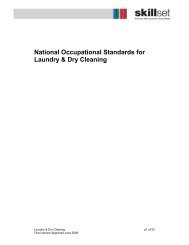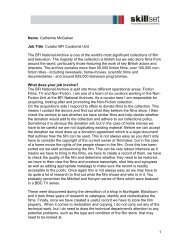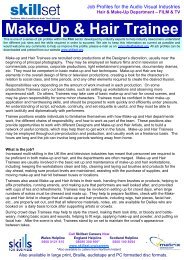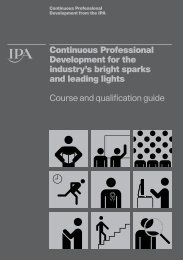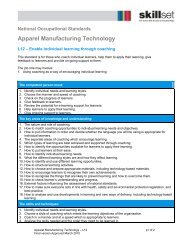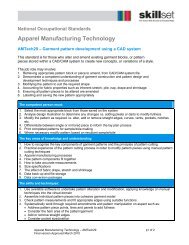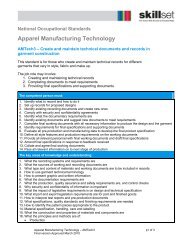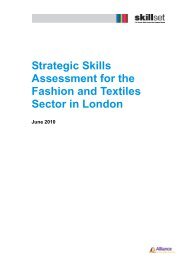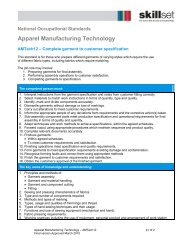Camera Operator - Film - Skillset
Camera Operator - Film - Skillset
Camera Operator - Film - Skillset
Create successful ePaper yourself
Turn your PDF publications into a flip-book with our unique Google optimized e-Paper software.
Typical career routes<br />
CAMERA OPERATOR – CAMERA DEPARTMENT – FILM<br />
Most <strong>Camera</strong> <strong>Operator</strong>s begin their careers as <strong>Camera</strong> Trainees or Runners, progressing to 2nd AC and, as they<br />
gain more experience, to 1st AC. Throughout this progression, they must build upon their experience, and achieve<br />
a high level of competence when operating a variety of cameras. Once this level of expertise and experience has<br />
been achieved, they may become a DoP or a <strong>Camera</strong> <strong>Operator</strong>.<br />
Essential knowledge & skills<br />
<strong>Camera</strong> <strong>Operator</strong>s need advanced technical abilities, combined with creative skills, and must know how to operate<br />
the camera to achieve the desired result. They need a good working knowledge of all camera systems, lenses and<br />
camera support equipment; of available accessories such as remote focus systems, video senders and receivers,<br />
and of any other regularly used equipment. Creative input and artistic ability are vital. As the decision–making<br />
process may take some time, patience is also essential.<br />
Key skills include:<br />
<br />
<br />
<br />
<br />
<br />
<br />
<br />
<br />
a good sense of visual composition, perspective and movement<br />
physical co–ordination and strength<br />
ability to combine creativity with technical skills<br />
precise attention to detail<br />
effective communication skills<br />
ability to collaborate, and to work as part of a team<br />
diplomacy and sensitivity when working with artists and crew<br />
knowledge of the requirements of the relevant Health and Safety legislation and procedures.<br />
Training and qualifications<br />
No specific qualifications are required to work in this role, although film schools and training courses offer a good<br />
basic grounding in the skills and knowledge required and in practice many <strong>Camera</strong> <strong>Operator</strong>s have studied for<br />
higher level qualifications. The most useful courses offer practical experience and may also include work<br />
experience placements. Relevant courses include City & Guilds courses, BTEC HNC/HNDs, Foundation degrees,<br />
first degrees and postgraduate qualifications in media, film and TV production or cinematography. Basic stills<br />
photography, which develops visual and composition skills, also provides a useful starting point in training for this<br />
role.<br />
<strong>Camera</strong> <strong>Operator</strong>s usually learn most of their practical skills through hands–on experience on the job. However,<br />
continual professional development is vital, especially as technology changes rapidly. The National <strong>Film</strong> and<br />
Television School offers industry recognised short courses for all grades. New shooting techniques, lighting set–<br />
ups and other practices are learnt by testing out new equipment, studying trade journals, attending exhibitions and<br />
joining industry forums.<br />
There are some industry led new entrant training schemes, which offer a training allowance and combine industry<br />
placements with short course training opportunities. These include schemes offered by Cyfle and Scottish Screen,<br />
and FT2 – <strong>Film</strong> and Television Training – camera assistant. Competition for places is fierce.<br />
Skillet’s network of Screen Academies are institutions that it has identified as offering the highest quality of film<br />
skills training. Details are available on the <strong>Skillset</strong> website: http://www.skillset.org/training/san/ssa/<br />
Where to go for more information<br />
<strong>Skillset</strong> is the Sector Skills Council for Creative Media. The first sources of information for all jobs in the industry<br />
are the National Occupational Standards. Browse <strong>Skillset</strong>’s website for links to our network of training partners,<br />
information about training and access to the comprehensive <strong>Skillset</strong>/BFI course database. Finally, <strong>Skillset</strong> Careers<br />
is the UK’s only specialist media careers advice service; for detailed media careers information and advice, visit<br />
www.skillset.org/careers.<br />
<strong>Skillset</strong> does not endorse or accept responsibility for any of the products, services or content of third party<br />
organisations or websites contained within this Job Profile, nor does it guarantee the quality of links to the<br />
external websites listed. Any concerns regarding an external link should be directed to its webmaster.<br />
Also available in large print, Braille, audiotape and PC formatted disc formats.



